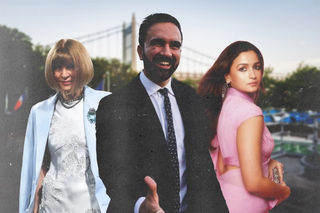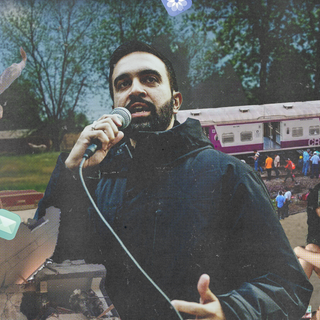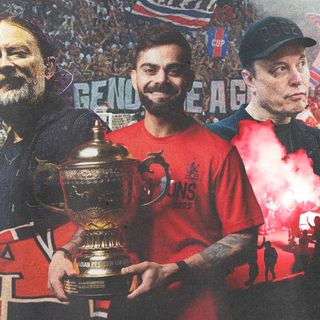
Zohran Mamdani Can Be on Vogue, But Can Anna Wintour Be on the Campaign Trail?
This week, we got closer to realizing a shared global dream of Mayor Mamdani — and Vogue saw the end of an era.

Present Tense is The Swaddle Team's stream of consciousness response to the world's madness.
Zohran Mamdani is the Democratic candidate of New York City's mayoral race. Did you know that he isn't Mayor Mamdani yet? That will actually happen in November. But for all intents and purposes, for the zeitgeist, he is.
Over the last decade, the polarization of politics has inflated the importance of a national head of state – thinking and voting for a Prime Minister or a President – and has in the process, deflected attention away from city and district administration, where all of us really do have the power to do something. Zohran Mamdani's campaign in New York City might as well have been the ghost image of a campaign to fix Mumbai. The parallels between these two cities remain uncanny as ever: both heaving metropolises, both heavily reliant on a locomotive public transport system, both astronomically expensive in terms of housing and cost of living, both the heart of culture, both the epicenter of a nation's financial aspirations, both the subject of romantic movie montages, both the backdrops of broken dreams. In other words, Zohran Mamdani's campaign has thrown into sharp relief just how bad we have it here. We are due any moment now to storm the BMC like the Bastille – if we can make it to the office through the potholes and the falling billboards.
Moreover, liberal discourse in the Indian context has largely divided itself into two poles: pro and anti Hindutva. This means wearing your allyship on your sleeve, and that is often for or against the BJP. Many who are against do not have a clear allegiance to an alternative. Our civic and political engagement has thus been boiled down to opposing an all-encompassing ideology, but seldom mobilizing around promising opposing figures. Lest we forget: Chandrasekhar Azad Ravan is a Member of Parliament representing the Nagina constituency in UP, from the Azad Samaj Party. He ran on a campaign promising to shake up politics and implement radical changes for social justice. We also had Sanjana Jatav elected as MP from the Bharatpur constituency last year – one of the youngest and only Dalit women in this position. The fanfare around such figures, however, was only insofar as they represented a challenge to the dominant ideology of Hindutva at the union level, and not as change-making political figures in their own right.
The question of Zohran Mamdani's relevance in India, then, isn't so much about the direct impact he could have on our lives and our cities over here. It is a reminder to notice the candidates among us who are worth mobilizing for. And it is also a reminder that it isn't enough to stand against one ideology without also standing for another. Calling on graphic designers to make "Hot Girls 4 Azad" tee shirts for our next election cycle.
Speaking of big establishment shake-ups: Anna Wintour is stepping down as the Editor-in-Chief of American Vogue, in what might be the fashion world's Roman empire falling. She is so embedded in the history of fashion journalism that, in 1988, she was the first editor-in-chief to put a pair of jeans on a Vogue cover. Think about that for a second. She also began putting celebs on covers instead of just models. Her 37-year tenure is older than many of you reading this. She is the Devil who wore Prada (we will get to the Kohlapuris in a minute). She's the Met Gala's boss lady, the overseer and the undertaker of everything that is anything in the world of glamour.
However. Does her departure also signal the declining relevance of monolithic cultural institutions? Anybody who is on the Internet and has a little curiosity can either analyse culture themselves or even create it if they've got enough hustle. Which isn't to make a case for influencer-led entertainment culture, but to ask whether we even need a fashion magazine bestowing sartorial legitimacy on us anymore. Personal style has gone through so many shifts: it has died, been brought back to life, and tied to identity and politics in a way that cannot be put down to a singular type or era. We are more heterogenous in our tastes than ever while working with homogenous offerings from above. Or maybe it's just that magazines don't influence culture anymore; algorithms do.
Alia Bhatt channelling Rekha from Silsila is another example of culture at the top repeating itself rather than renewing. If today's major movie stars must call back to yesterday's major movie stars to stay relevant, do we even have a major movie star legacy for tomorrow? If the last two years have shown anything, it is that the world is undergoing an existential shift: there is a lot of distraction crowding the surface but none of it is solid or foundational. The world's political sensibilities have changed, and frivolity is replete with irony more than any genuine enjoyment. Who can afford to be frivolous in this economy? We are literally talking about war and genocide every day.
Does this mean that the Zohrans of the world cannot coexist with the Annas? Not exactly – it just means that Zohran Mamdani has a place in fashion, but Anna Wintour doesn't have one in politics. It's easier to imagine him on a magazine cover than her at a rally. Politics adopted democracy, and now culture is doing it too.
And on that note: the Prada Kohlapuris are not it.
Related


Will Thoughts and Prayers Save Us? And Other Questions
